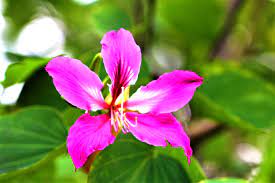Kachnar, also known as Mountain Ebony or Bauhinia variegata, is a flowering tree native to Southeast Asia. It is known for its various potential benefits, alternative names, and traditional uses. However, it's essential to note that while some of these benefits are supported by traditional knowledge, scientific research may not have extensively validated all of them. Always consult with a healthcare professional before using any herbal remedies.
English : Mountain Ebony, Hindi :Kachanar, Kanchanar, Kachnar, Sanskrit :Kancanaraka, Punjabi :Kanchnar, Urdu : Kanchnal Burmese, Bwaycheng, Bwechin, Assamese :Kancan, Kanchan, Bengali :Kanchana, RaktaKanchana,Gujrati :Champakati, Kanchnar, Kachnar, Kannada :Keyumandar, Kanchavala, Kashmiri : Kalad, Malayalam : ChuvannaMandharam, Marathi : Kanchana, Raktakancana,Oriya :Kachana, Kaniara, Tamil :Sigappumandarai, Sihappumantarai, Telugu : Deva Kanchanam.
Benefits:
-
Antioxidant Properties: Kachnar contains compounds with antioxidant properties that may help protect cells from oxidative stress.
-
Anti-inflammatory Effects: It is believed to have anti-inflammatory properties, which may be useful in managing inflammation-related conditions.
-
Astringent Properties: Kachnar is considered to have astringent properties, which may help in treating conditions related to excessive bleeding and fluid loss.
-
Respiratory Health: In traditional medicine, Kachnar has been used for respiratory conditions such as asthma and bronchitis.
-
Digestive Health: It is thought to aid digestion and may be used to address gastrointestinal issues.
Other Names:
- Mountain Ebony
- Orchid Tree
- Kachanar
- Camel's Foot Tree
- Raktakanchan
Potential Side Effects:
While Kachnar is generally considered safe when used appropriately, some potential side effects may include:
- Allergic reactions: Some individuals may be allergic to Kachnar.
- Gastrointestinal issues: Excessive consumption may lead to digestive problems.
Usage:
- Herbal Medicine: Kachnar is often used in traditional medicine systems like Ayurveda for various health conditions.
- Tea: A decoction or tea made from Kachnar bark or flowers is sometimes consumed for its health benefits.
- Powder: The bark or flower powder may be used in herbal formulations.
Homemade Remedies:
-
Kachnar Tea:
- Boil Kachnar bark or flowers in water.
- Strain and drink the tea. It is sometimes sweetened with honey.
-
Kachnar Bark Powder:
- Collect Kachnar bark and sun-dry it.
- Grind it into a fine powder.
- Consume a small amount of the powder with water or mix it with honey.
-
Kachnar Flower Salad:
- Use fresh Kachnar flowers in salads for a mild, slightly astringent flavor.
Important Notes:
- Dosage: The appropriate dosage can vary based on individual factors, and it's crucial to consult with a healthcare professional for guidance.
- Pregnancy and Nursing: Pregnant and nursing women should avoid Kachnar unless advised otherwise by a healthcare provider.
- Interaction with Medications: Kachnar may interact with certain medications, so it's essential to inform your healthcare provider about any herbal remedies you are using.
Always exercise caution and seek professional advice when considering it.
Buy Kachnar Bark Raw--https://www.nutrixia.in/products/kachnar-chhal
Buy Kachnar Bark Powder--https://www.nutrixia.in/products/kachnar-powder
Buy Kachnar Gugglu ghanvati--https://www.nutrixia.in/products/kachnar-guggal-gugal-ghanvati-tablet
